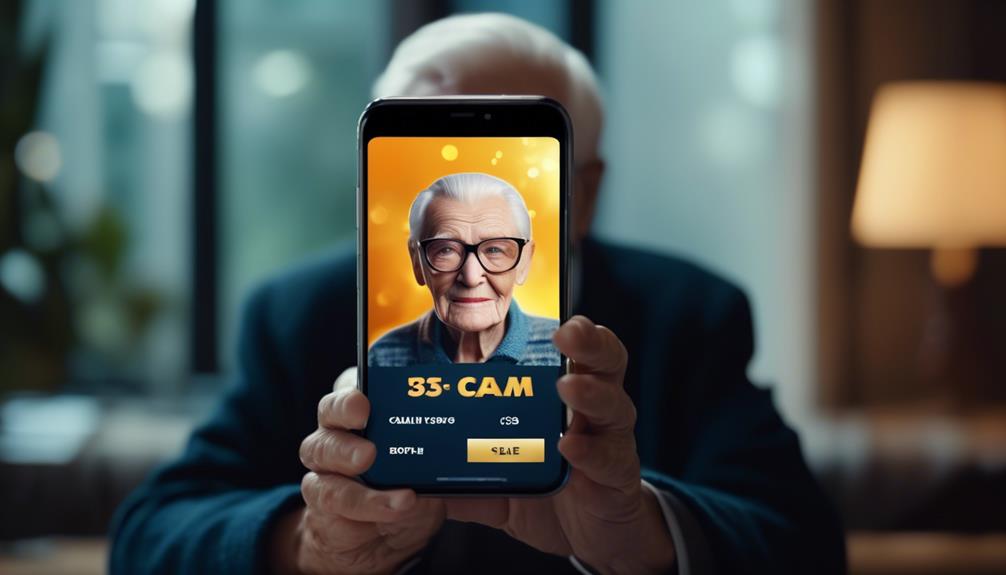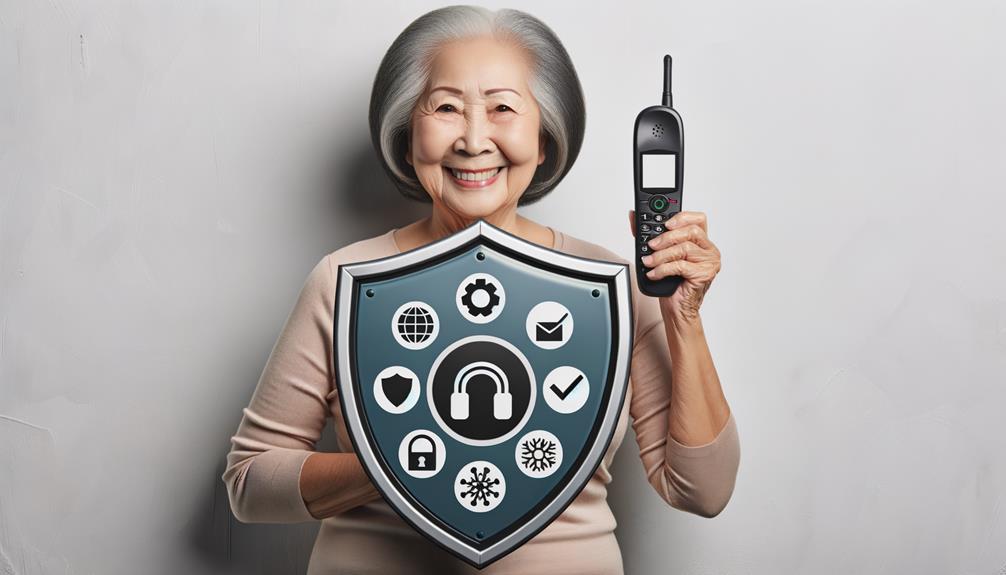Protecting seniors from scam calls is vital as the number of these calls continues to rise. Equipping them with knowledge and tools is crucial for safeguarding their finances and personal information. Seniors can be vulnerable to these scams, but by following the seven key tips outlined in this discussion, they can empower themselves to navigate the digital landscape confidently and resiliently.
No-Call Lists

Registering your home and cellphone numbers with the national Do Not Call registry can limit unwanted calls. This step can be taken by calling 888-382-1222 or visiting DoNotCall.gov to sign up. No-Call Lists are effective in stopping unwanted telemarketing calls from legitimate businesses, but they do not prevent fraudulent scam calls. It's important for seniors and older adults to understand that while registering with the Do Not Call registry can limit at least some unwanted calls, it may not stop all scam calls. It's crucial for older adults to be cautious about sharing personal information over the phone and to be aware that scam calls can still occur even after registering with the Do Not Call registry. Therefore, in addition to being on the No-Call Lists, seniors should remain vigilant and cautious when receiving phone calls, especially those requesting personal information. By taking these steps, older adults can better protect themselves from unwanted telemarketing and potential scam calls.
Caller ID Awareness
Awareness of Caller ID is vital for seniors to prevent falling for scam calls. Seniors can protect themselves by verifying caller ID info and not sharing personal information with unknown callers. Educating them on this importance is essential.
Caller ID Importance
Understanding the value of caller ID in identifying and avoiding scam calls is crucial for protecting seniors. By using caller ID, seniors can screen and differentiate legitimate calls, shielding themselves from scammers. Verifying the caller ID before answering helps seniors protect themselves from falling victim to scams. It's essential to educate seniors about warning signs of phone scams and emphasize the importance of paying attention to caller ID. Seniors should also be aware of resources like the National Elder Fraud Hotline, which can assist in dealing with potential scam calls.
Caller ID Verification
Regularly checking caller ID before answering can help seniors identify potential scam calls, making informed decisions. With caller ID verification, individuals can see the incoming call's number, name, and location, crucial for protecting personal information. This practice is especially important as phone call scams targeting seniors are increasing. By being aware of who is calling, seniors can avoid falling for fraudulent schemes and prevent identity theft. Additionally, caller ID verification helps recognize known and trusted numbers, providing a sense of security. It's an essential tool in the fight against telephone-based fraud.
Personal Information Protection

To avoid scam calls, never share account numbers, Social Security numbers, or passwords over the phone. Safeguarding personal information prevents fraud and identity theft. Here are three tips to protect loved ones from phone scams:
- Verify the Caller: Advise aging parents to end calls requesting personal information. Instead, suggest calling the institution using a verified number.
- Educate Family Members: Take time to educate about common scams and safeguarding personal information.
- Protect Your Parents: Assist them in setting up call screening and blocking unknown numbers. Also, advise against giving out personal information.
Scare Tactics Education
As a preventive measure, seniors should learn to identify scare tactics used by scammers to protect themselves. Scammers manipulate seniors using fear to gain personal or financial information. Education plays a vital role in safeguarding seniors from falling prey to these tactics. Understanding fear-inducing strategies employed by scammers helps seniors protect themselves and their loved ones. One common scare tactic in scam calls is creating a sense of urgency or panic. This tactic aims to cloud judgment and prompt immediate action. Seniors need to stay calm and verify such alarming claims. Scammers also use threats to coerce compliance from seniors. Education empowers seniors to recognize these coercive tactics and seek assistance. By understanding fear-based strategies, seniors can better identify and avoid potential scam calls.
Payment Caution

Seniors must verify requests before paying. They should use secure methods like credit cards or payment apps. This adds protection against scams. It's crucial to research payment requests to avoid falling for fraudulent schemes.
Verify Before Paying
Before paying, it's essential to verify payment requests to prevent scams. Seniors should be cautious, especially with urgent demands. They can follow these tips to avoid scammers:
- Verify the requester's identity before sharing financial information.
- Be cautious of urgent phone demands; don't act hastily.
- Seek help from trusted individuals when unsure about payment legitimacy.
Use Secure Payment Methods
It's crucial to use secure payment methods to protect against fraudulent scam calls. Seniors should be cautious about sharing personal information like bank account or credit card details over the phone. Encourage them to use trusted payment methods and avoid making payments over the phone unless they initiated the call. If they receive unsolicited payment requests, advise them to verify directly with the organization. Also, caution them about requests for transfer fees or payments, as these could be red flags for potential scams. By using secure payment methods, seniors can protect themselves from financial exploitation and fraudulent activities.
Phone Etiquette Practice
To enhance phone etiquette, individuals should register their numbers with the Do Not Call registry to reduce unwanted calls. Furthermore, they can utilize wireless providers' tools or spam-blocking apps on cellphones. They can also take advantage of built-in call blockers on smartphones, such as silencing unknown callers on newer iPhones or using the Smart Call feature on Samsung Galaxy phones. Another tip is to set up anonymous call rejection on home phones and screen out calls from blocked caller ID information.
Reporting Scam Calls

When suspecting scam calls, individuals must report them promptly to authorities for their and others' safety. By doing so, they can protect seniors and loved ones from falling victim to these schemes. It's essential to report any instances where personal information is requested, such as Social Security numbers or banking details. To reduce unwanted calls, individuals can register with the national Do Not Call registry managed by the Federal Trade Commission. Additionally, using tools provided by wireless carriers, like AT&T's ActiveArmor Mobile Security app, can help stop scam calls and texts. Smartphone users can utilize built-in call blockers, such as silencing unknown callers on newer iPhones or using the Smart Call feature on Samsung Galaxy phones. For home phones, setting up anonymous call rejection can screen out calls from blocked caller ID information. Ultimately, reporting scam calls not only protects the individual but also contributes to community safety, ensuring that no one falls prey to these fraudulent activities.
Frequently Asked Questions
How Do I Protect My Elderly From Scam Phone Calls?
To safeguard the elderly from scam calls, use call blockers, educate about common scams, involve family, and register for the Do Not Call registry. Also, promote scam awareness and legal protection.
How Do I Stop Senior Benefits Scam Calls?
To prevent senior benefits scam calls, educating seniors on technology, privacy, and finance is essential. Communities can offer legal support to curb these scams.
How Do I Stop Nuisance Calls to the Elderly?
To prevent nuisance calls to the elderly, it's crucial to focus on phone etiquette, technology assistance, and phone privacy. Seniors should be educated on scam prevention and empowered with legal protection. Involving family can also help mitigate the impact of these calls.
Is There a Call Blocker for Senior Citizens?
There are call blockers specifically designed for seniors, offering affordable and user-friendly features. Reliable brands ensure customizable settings, easy installation, and tech support for effective results. These blockers are tailored for seniors, making them easy to use and understand.
Conclusion
In conclusion, seniors can shield themselves from scam calls by registering numbers with the Do Not Call registry. Additionally, increasing awareness about common phone scams is crucial. Balancing caution with empowerment is important. Education and call-blocking technology can work hand in hand to protect personal information. This reduces the risk of financial exploitation.



